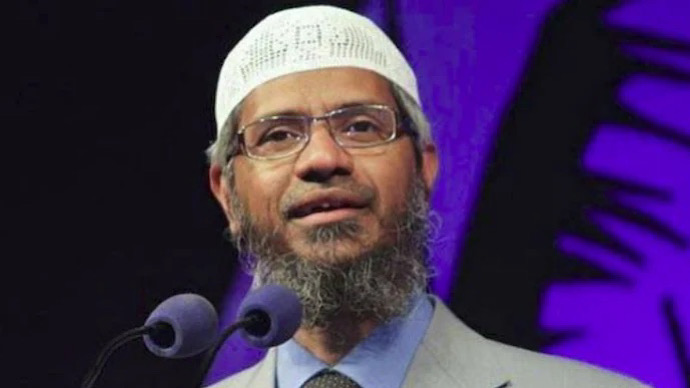Malaysia greenlights controversial Islamic preacher Zakir Naik
Wanted in India for money laundering, he now can preach in public after a ban imposed five years ago for making incendiary sermons. Malaysian political leaders and human rights activists urge the government to reconsider the decision. His attacks against the believers of other religions risk undermining harmony and coexistence.
Kuala Lumpur (AsiaNews) – Malaysian authorities have lifted a ban imposed five years ago on a controversial Islamic preacher, Zakir Naik, who is wanted in India for money laundering.
The Mumbai-born Muslim orator was banned for remarks he made regarding Hindus and Chinese living in Malaysia, during a speech in Kota Baru, Kelantan State, in 2019.
In the interest of national security and preserving racial harmony, police reportedly banned the preacher from making public speeches.
Last month, Naik gave a speech before a crowd for the Perlis International Sunnah Convention 2025 in which he ostensibly said that Muslims will have to answer in the afterlife for not making any proselytising efforts.
He addressed Malaysian Muslims directly, urging them to intensify their efforts to spread Islam among non-Muslims, as well as criticising them for not making full use of the laws that allow the propagation of the faith among those who do not profess Islam.
Last week, when the issue was raised in Parliament, Home Affairs Minister Saifuddin Nasution Ismail said that no orders restrict Zakir from giving public speeches.
“Though a temporary ban was issued against the controversial preacher in 2019, it is currently not in effect,” Saifuddin explained. “The government has not placed any restrictions on Zakir Naik (giving public speeches),” the minister said in response to a question from an MP from Penang.
Reconsider the decision
Reacting to the m minister’s statement, Sarawak Assemblyman Baru Bian called on the federal government to reconsider the decision and reinstate the ban on Zakir from giving public speeches.
“I was extremely disappointed to read the Home Minister’s statement that the ban on Zakir Naik from speaking in public is no longer in effect.”
“It is incomprehensible to right-thinking Malaysians that the ban was lifted without any justification and no release of reports of the investigations into the incidents complained about against Zakir,” said the assemblyman, an Evangelical Christian.
When the ban was imposed, the police had cited "serious concerns" for national security and racial harmony and these elements have not disappeared.
“It is my understanding that as of August 2019, Sarawak has banned Zakir Naik from entering the state. This ban was implemented during the tenure of the late Chief Minister Pehin Sri Adenan Satem,” Baru said.
“I hope that the Sarawak government ensures that the ban remains in effect” at least until “he apologises” and commits to respect the principles of harmony and freedom of worship.
“National security and harmonious coexistence must never be compromised for political expediency,” he added.
In the past, Zakir Naik mocked and insulted minorities and followers of other religions, in particular Malaysian citizens of Chinese and Indian origin.
“He has never apologised for any of his offensive statements, and I find it hard to accept that he is again allowed to speak publicly,” Baru Bian said.
Lifting the ban shows that the government does not consider his words a threat and views him as a "non-controversial" leader.
However, “By denigrating other religions, Zakir not only disregards the values of mutual respect and tolerance that are integral to Malaysia’s diverse society but also risks sowing division among its people,” said the Sarawak lawmaker.
“It is precisely such scenarios that underscore the need for laws like the Sedition Act, which serve as safeguards against speech that has the potential to incite unrest,” he said.
Freedom and harmony
For Baru, the defence of freedom of speech must not be at the expense of national harmony, a primary factor.
Known for its long-standing commitment to religious coexistence and mutual respect, the State of Sarawak is an example of how people in a multi-religious society can coexist peacefully.
“We pride ourselves on policies that foster inclusivity and unity, where different religious and ethnic communities live together without fear of discrimination or division,” Baru explained.
“The peace and stability of Malaysia’s social fabric must take precedence over any individual’s right to free speech, particularly when such speech has the potential to incite hatred, intolerance, or discord,” he added.
Echoing the Sarawak lawmaker’s sentiments, the vice-president of the Global Human Rights Federation, Peter John Jaban, urged the state government to maintain the ban on radical preachers, even if the federal Home Ministry lifted the gag order.
Peter noted that Zakir, a preacher wanted in his homeland, has a past of controversial statements in Malaysia.
“We hope the Sarawak government will continue to protect Sarawak’s interests in maintaining a peaceful environment and upholding the values of inclusivity, tolerance, and social harmony,” said the activist.
Zakir “certainly should not be allowed to spread hate in Sarawak or to cause tensions between our communities,” Peter said in a statement to the media.
21/08/2019 14:36
18/11/2016 13:50
22/07/2016 10:26
10/01/2020 14:22








.png)










